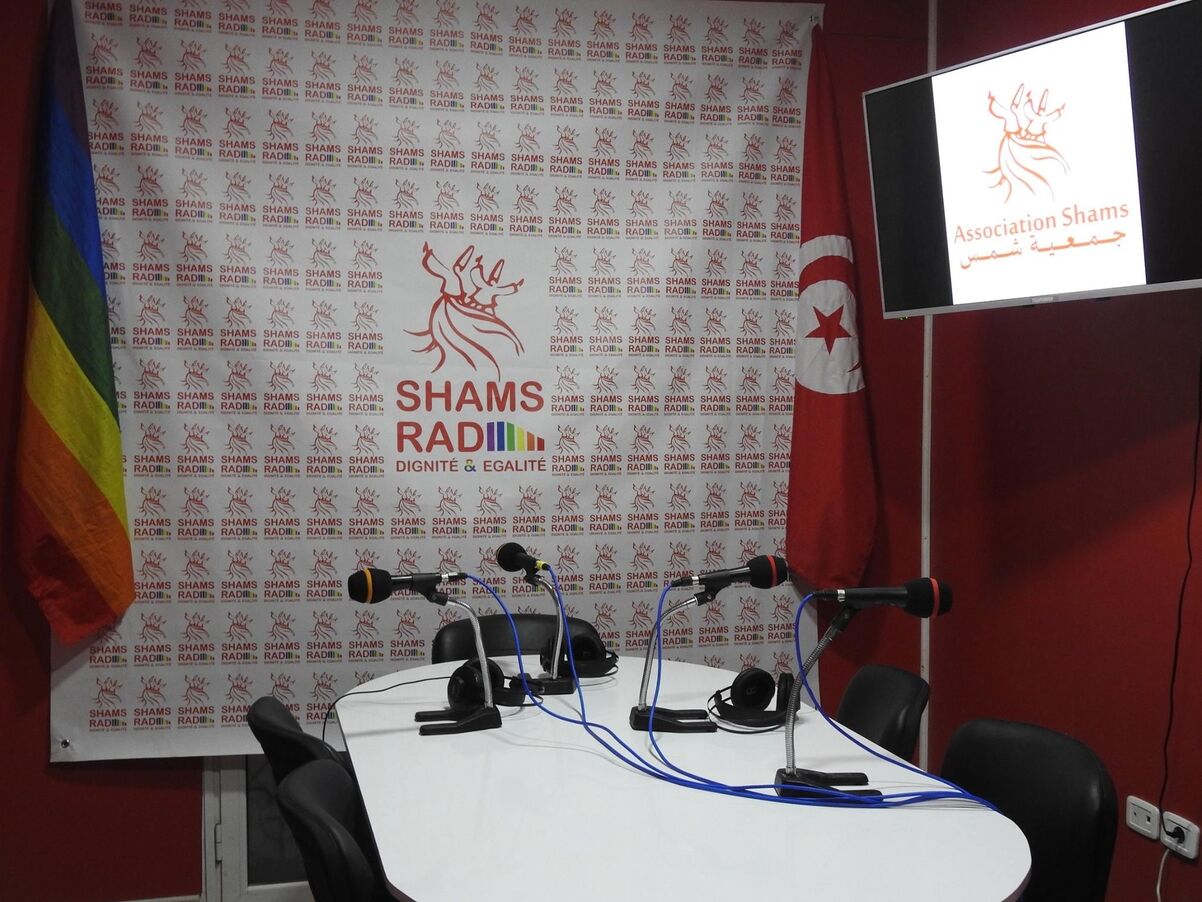Conservatives opposed to the launch of Tunisia’s first LGBTQ radio station are marching against equality in the nation’s capital this weekend.
On Saturday, protesters will be marching down Avenue Habib-Bourguiba in the middle of downtown Tunis to demonstrate against Radio Shams, which launched on Dec. 15 to heated backlash in the majority Muslim nation. Association Shams, the non-governmental organization behind the station, has reportedly received more than 4,000 hate messages and death threats in the past week.
Senda Ben Jebara, a board member with the LGBTQ advocacy group Mawjoudin We Exist, says public reaction to the announcement was overwhelmingly negative.
“A lot of people started writing articles and Facebook posts about how this is not acceptable,” she tells INTO in an exclusive interview. “Instead of accepting people having their own radio station, they said, ‘We need to persecute these people. They have no right to exist. They are sick. They are the devil.’”
People often fear and loathe what they don’t understand in the conservative nation, Ben Jebara says. Death threats against LGBTQ groups have been common since advocates began to lobby for equality in the wake of the 2011 revolution.
Despite frequent challenges, local activists have made significant strides in recent year.
Mehdi Ben Gharbia, Tunisia’s minister of relations with constitutional bodies, civil society and human rights, announced in September that the country would be ending the practice of forced anal examinations.
A widely condemned practice international human rights groups have likened to torture, the procedure is used to “prove” the homosexuality of someone accused of same-sex relations, which remain a crime in Tunisia. Article 230 of the Penal Code, a remnant of French colonial rule, mandates up to three years in prison for anyone declared guilty of homosexuality.
These tests often serve as the smoking gun in those cases, even despite the fact that they aren’t scientifically sound. Critics point out that those subjected to the test could have a loosened sphincter for a number of other reasons, including constipation and Parkinson’s disease.
But Ben Gharbia claimed it would be four years before the ban, which resulted from U.N. recommendations, is implemented.
In the meantime, he said authorities will be educating members of the LGBTQ community about their rights, should they be apprehended by police. The government minister claimed the tests are “optional.” The problem is that gay men aren’t given a choice: Human Rights Watch claimed in a 2017 report that a detainee was beaten repeatedly by law enforcement officers in the town of Kairouan until he submitted to the anal test.
Mawjoudin We Exist has begun meeting with doctors, advocacy groups, and even government leaders to stop the tortureand ensure the tests are outlawed immediately.
Ben Jebara says these conversations are a major step forward.
“People at least now are willing to listen to us,” she claims. “People are willing to meet with us who did not really care that much about LGBTQ rights before. The country doesn’t really accept us yet, but they know we are here. They are no longer in denial about the existence of LGBTQ people in the country.”
As counterintuitive as it seems, even this weekend’s protests are an indication of progress in Tunisia, where two-thirds of the population is in favor of its prohibition on sodomy.
Members of the country’s LGBTQ community will be coming out on Saturday to counterprotest the right-wing rally, a rare moment of public visibility for queer and trans people. Although Ben Jebara says that LGBTQ advocates reguarly march for gender equality and human rights, they seldom get the chance to picket for “something that is threatening their own existence.”
“We want to find our space within societyin our communities, our families, and our workplaces,” she claims. “That seems very normal, but we don’t even have that.”
Ben Jebara fears, however, there could be violence this weekend between LGBTQ groups and conservative forces. An May 2016 event scheduled to raise awareness about rising hate crimes in Tunisia was met with violent opposition from right-wing extremists. An event called “Beat the Gays” was scheduled in response, and on Facebook, organizers with the gathering called for gays to be thrown off buildings.
But advocates believe that resources like Radio Shams are worth fighting for.
“Since our media doesn’t even give us space to talk about our issues, it’s important to create our own,” Ben Jebara says. “I think it’s important to talk about our issuesfirst, for people to understand them and second, for people to relate to them. [LGBTQ people are] not alone. There are so many people like them.”
Image via Facebook
Help make sure LGBTQ+ stories are being told...
We can't rely on mainstream media to tell our stories. That's why we don't lock our articles behind a paywall. Will you support our mission with a contribution today?
Cancel anytime · Proudly LGBTQ+ owned and operated
Read More in Impact
The Latest on INTO
Subscribe to get a twice-weekly dose of queer news, updates, and insights from the INTO team.
in Your Inbox













